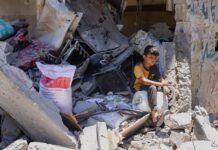Alexandra Sharp
Foreign Policy / October 4, 2024
The operation occurred hours before Iran sent its foreign minister to Beirut.
Senior Hezbollah official Hashem Safieddine attends the funeral ceremony of another commander in Beirut.
The Israeli military said on Friday that its forces have killed “approximately 250” Hezbollah militants since launching a ground incursion in southern Lebanon on Tuesday—around 100 of whom have been killed in the past 24 hours, Israel Defense Forces (IDF) spokesperson Lt. Col. Nadav Shoshani said.
Those killed may include Hashem Safieddine, a cousin and possible successor of late Hezbollah leader Hassan Nasrallah. Safieddine was targeted in overnight Israeli airstrikes on a bunker in Beirut, where he was believed to be meeting with other senior Hezbollah officials. The United States and Saudi Arabia designated Safieddine a terrorist in May 2017 for his leadership role in the Iranian-backed group.
“Alongside our casualties, we’ve been able to inflict a serious blow to Hezbollah, to its senior level, and to its tactical-level commanders,” Shoshani said. More than 10 Israeli soldiers have been killed this week in fighting in southern Lebanon as well as a drone attack from Iraq on northern Israel.
The Israeli attack occurred mere hours before Tehran sent Iranian Foreign Minister Abbas Araghchi to Beirut to meet with Lebanese Prime Minister Najib Mikati and Parliament Speaker Nabih Berri. This was the first time that a senior Iranian official has visited Lebanon since Nasrallah’s death and Iran’s subsequent ballistic missile attack against Israel on Tuesday.
“We support efforts for a cease-fire on the condition that it would be acceptable to the Lebanese people, acceptable to the resistance, and thirdly, it would be synchronized with a cease-fire in Gaza,” Araghchi said. Iran has long backed Hezbollah and other proxy groups—including Hamas in Gaza, the Houthis in Yemen, and various militias in Iraq and Syria—as part of Tehran’s so-called axis of resistance against Israel and the United States.
Meanwhile, Israeli Prime Minister Benjamin Netanyahu has vowed to retaliate against Iran for its Tuesday missile attack. Although the United States has urged Israel not to directly attack Tehran’s nuclear facilities, the White House said on Thursday that it was “discussing” possible Israeli strikes on Iran’s oil infrastructure. Iranian Supreme Leader Ayatollah Ali Khamenei reiterated on Friday that Tehran and its allies will not back down in the face of Israel’s threats, calling Iran’s latest attack “minimum punishment.”
The IDF, however, continued its efforts against Hezbollah. Massive airstrike operations across southern Lebanon in recent weeks have killed more than 2,000 people and displaced around 1.2 million others. Overnight on Friday, Israel struck the Masnaa border crossing, the main thoroughfare between Lebanon and Syria through which tens of thousands of people have fled Israeli bombardments.
Israel’s military has accused Hezbollah of using Masnaa to transport military equipment. The group is widely believed to have received much of its weaponry from Iran via Syria, and its militants have a significant presence on both sides of the border. Most public border crossings between the two countries remain open.
Alexandra Sharp is the World Brief writer at Foreign Policy












